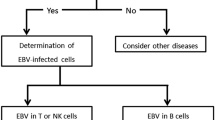Abstract
We performed distal gastrectomy with D2 lymph node dissection, pathological stage was Stage IB (T2N0M0), in a 68-year-old male with gastric adenocarcinoma. We then monitored serum p53 antibody titers for 5 years and found it consistently decreased, without disease recurrence. Although the s-p53-Ab titer remained positive even after 2 years, it decreased to 16.5, 4.45, 2.66, 1.55, and 1.18 U/ml at 3 months, 7 months, 1 year, 2 years and 3 years after surgery, respectively. The s-p53-Ab titer finally converted from positive to negative at 31 months postoperatively without any sign of recurrence by computed tomography examination at 5 years after surgery. This case report shows that the changing pattern of s-p53-Ab titer after surgery may be useful to identify patients without recurrence. Further studies are required to gain a more precise understanding of the clinical impact of s-p53-Ab titer monitoring in gastric adenocarcinoma.



Similar content being viewed by others
References
Shiota G, Ishida M, Noguchi N, et al. Clinical significance of serum p53 antibody in patients with gastric cancer. Res Commun Mol Pathol Pharmacol. 1998;99:41–51.
Shimizu K, Ueda Y, Yamagishi H. Titration of serum p53 antibodies in patients with gastric cancer: a single-institute study of 40 patients. Gastric Cancer. 2005;8:214–9.
Nakajima K, Suzuki T, Shimada H, et al. Detection of preoperative serum anti-p53 antibodies in gastric cancer. Tumour Biol. 1999;20:147–52.
Shimada H, Shiratori T, Takeda A, et al. Perioperative changes of serum p53 antibody titer is a predictor for survival in patients with esophageal squamous cell carcinoma. World J Surg. 2009;33:272–7.
Shimada H, Nagata M, Cho A, et al. Long-term monitoring of serum p53 antibody after neoadjuvant chemotherapy and surgery for esophageal adenocarcinoma: report of a case. Surg Today. 2014;44:1957–61.
Maehara Y, Kakeji Y, Watanabe A, et al. Clinical implications of serum anti-p53 antibodies for patients with gastric carcinoma. Cancer. 1999;85:302–8.
Werner S, Chen H, Tao S, et al. Systematic review: serum autoantibodies in the early detection of gastric cancer. Int J Cancer. 2015;136:2243–52.
Tokunaga R, Sakamoto Y, Nakagawa S, et al. The utility of tumor marker combination, including serum p53 antibody, in colorectal cancer treatment. Surg Today. 2017;47:636–42.
Suzuki T, Shimada H, Ushigome M, et al. Three-year monitoring of serum p53 antibody during chemotherapy and surgery for stage IV rectal cancer. Clin J Gastroenterol. 2016;9:55–8.
Shimada H, Ochiai T, Nomura F. Japan p53 Antibody Research Group. Titration of serum p53 antibodies in 1,085 patients with various types of malignant tumors: a multiinstitutional analysis by the Japan p53 Antibody Research Group. Cancer. 2003;97:682–9.
Japanese Gastric Cancer Association: Japanese classification of gastric carcinoma: 3rd English edition. Gastric Cancer. 2011;14:101–12.
Shimada H, Noie T, Ohashi M, et al. Clinical significance of serum tumor markers for gastric cancer: a systematic review of literature by the Task Force of the Japanese Gastric Cancer Association. Gastric Cancer. 2014;17:26–33.
Shimada H, Nabeya Y, Okazumi S, et al. Prognostic significance of serum p53 antibody in patients with esophageal squamous cell carcinoma. Surgery. 2002;132:41–7.
Morell A, Terry WD, Waldmann TA. Metabolic properties of IgG subclasses in man. J Clin Invest. 1970;49:673–80.
Author information
Authors and Affiliations
Corresponding author
Ethics declarations
Conflict of interest
Hideaki Shimada received a research grant from Medical and Biological Laboratories, Co., Ltd. The other co-authors declare no conflict of interest.
Human/animal rights
All procedures followed were in accordance with the ethical standards of the responsible committee on human experimentation (institutional and national) and with the Helsinki Declaration of 1964 and its later amendments.
Informed consent
Informed consent was obtained from the patient for inclusion in the study.
Electronic supplementary material
Below is the link to the electronic supplementary material.
12328_2017_749_MOESM1_ESM.jpg
Supplementary material 1 The relationship between each assumptive half-life image and the changing pattern of s-p53-Abs after surgery. The s-p53-Ab changing line is located more to the right side than the 50-day half-life line (JPG 55 kb)
Rights and permissions
About this article
Cite this article
Murayama, K., Nanami, T., Suzuki, T. et al. Negative conversion of high serum p53 antibody titers in a patient with gastric cancer at 31 months after surgery . Clin J Gastroenterol 10, 357–360 (2017). https://doi.org/10.1007/s12328-017-0749-9
Received:
Accepted:
Published:
Issue Date:
DOI: https://doi.org/10.1007/s12328-017-0749-9




